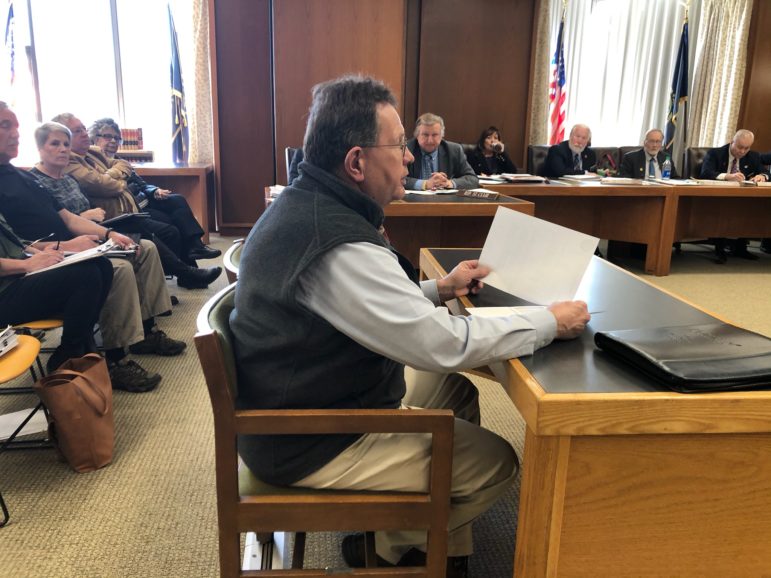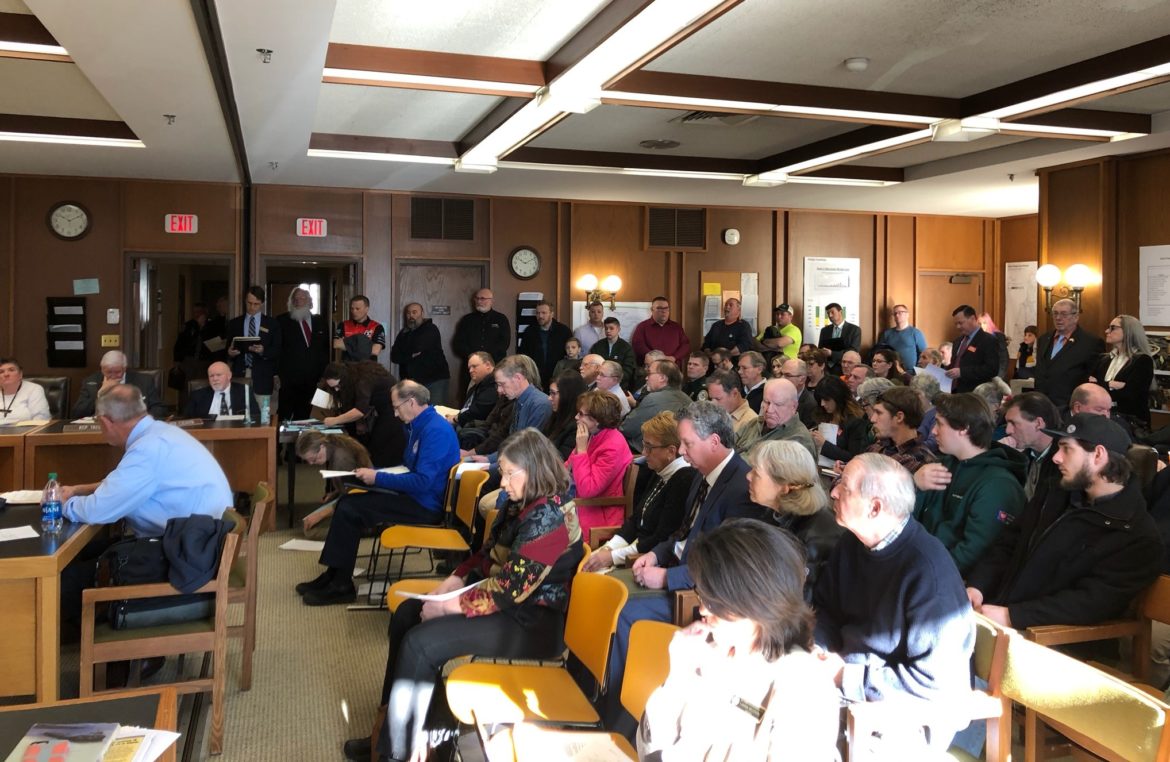By PAULA TRACY, InDepthNH.org
CONCORD – Seven bills were heard on Wednesday dealing with the increased use of All-Terrain Vehicles, including how to accommodate continued growth, citizen concerns and environmental factors.
At packed hearings at the Legislative Office Building that spanned the entire day, proposed legislation was debated related to expanding and contracting the state’s trail system that serves ATVs.
What many people were willing to agree on was taking a comprehensive rather than a piecemeal approach to Off-Highway Recreation Vehicle use in the state.
Advocates and opponents of increasing the trail system were equally passionate about public access, noise, how to deal with “phantom dust” kicked up by the machines and finding state revenue for a state study.
While legislators passed a study bill last year, they did not fund it.
ATVs are relatively new and their use in the state has exploded over the past decade.
Much of the focus of the development of the trail system in the past has been in the North Country. Other areas of the state, including Mink Hills near Hillsborough, are seeing increased trail impact with pressure to use public roads to access trails.
Some said the state needs to do more to open up public lands for such use to minimize impacts on roads. Others said there needs to be a comprehensive approach to the development of trails, and more abutter input.
Bills this year that attempt to circumvent the existing local permitting system as some of the bills attempted to do are not helpful, opponents said.
One bill looked to remove access from roads that were approved by the legislature, including Back Lake Road in Pittsburg, a popular route to lodging, restaurants, and businesses, which was strongly opposed.
OHRV bills heard Wednesday were before the House Resources, Recreation and Development and House Transportation Committees.
House Bill 1165 – The bill to restore the Gorham portion of the Presidential Rail Trail to its summertime non-motorized status.
House Bill 1156 – Establishes a committee to study minimizing the use of public roads in the 1,000-mile OHRV trail system known as Ride the Wilds in Coos County.
House Bill 1316 – Seeks to mandate new trails in the Nash Stream State Forest and Coleman Park, and an amendment seeks to open up Hoit Road Marsh in Concord through legislation.
House Bill 1426 – Requires an OHRV club to have certain “phantom” dust tests performed on new rail-trails prior to use as an OHRV trail.
House Bill 1427 – Would remove the authorization for OHRV use on certain sections of state highways authorized by legislation, and an amendment that would eliminate a trail connector crossing on Route 114 in the town of Henniker.
House 1438 – Would allow OHRVs on all non-divided public roads in the state for those who have driver’s licenses.
House Bill 1688-FN – Would be related to speed limits on OHRV roads.

Paula Tracy photo
Harry Brown of Stewartstown, considered the “founding father” of the 1,000-mile Ride the Wilds OHRV trail system, said the impetus for the connected system was to stimulate economic impact in the North Country and it has succeeded mostly by using private lands to create a trail system.
Over the past six years, there has been increased concern and opposition to the use of public roads by OHRVs related to connecting to the Ride the Wilds.
“We never intended to utilize roads except for connectivity between trails and access to municipal services. Initially, we had no choice because we had to develop relationships with landowners – private and hopefully public,” Brown said.
He said going forward, the effort is to minimize the use of public roads and maximize access to public land. But there has been pushback from those who would like to keep the OHRVs off public land.
One of the first bills heard, House Bill 1316, seeks to open more trails on the public 40,000-acre Nash Stream Forest in Odell and at Coleman State Park in West Stewartstown. It had an amendment attached that would reopen an area in East Concord, Hoit Road Marsh, to OHRV use.
Brad Simpkins, director of the state Division of Forest and Lands opposed that bill.
His agency manages over 260,000 acres of conservation easement land, including the Nash Stream Forest. He said his agency would be supporting studies on OHRV use.
“We need to look at this whole issue and not piecemeal,” Simpkins stressed. “Managing public lands is not an easy task.”
He said there are many different potential constituents, including motorized and non-motorized users. “We try to strike an appropriate balance,” he said.
Susan Arnold, vice president for conservation for the Appalachian Mountain Club, said this bill would circumvent existing permitting processes. The problem, she said, is simple.
“There is no strategic plan or planning process for the development of trails in the North Country specifically,” she said.
“AMC knows there is a lot of room up there. Bringing all the constituencies to the table makes sense,” Arnold said. “We really need that process.”
While Arnold said there has been a lot of economic impact from ATVs, the non-motorized community also adds significantly to the economic life of the North Country.
A Plymouth State University economic study found $18 million in annual economic activity related to hikers and those using the AMC resources in the mountains, she said.
Attorney Peter Roth of Concord agreed that there needs to be a comprehensive approach.
“Without consideration of other users, you have conflicts,” Roth said.
Caleb Dobbins, state maintenance engineer for the Department of Transportation, said the idea of opening all the non-divided state roads to OHRVs would be problematic in terms of safety, specifically in terms of speed, hours of operation and potential conflicts.
Doug Hayes said he is in favor of the bill which would open all roads to OHRVs.
He said the new vehicles are far safer than they used to be in the 1980s with four-wheel disk brakes, seat belts and more. He has insurance to cover the vehicle on and off-road and the cost is the same as car insurance.
Hayes said the vehicles range in price from $5,000 to $26,000.
“People are spending lots of money on them and there are limited places you can ride on them,” Hayes said. “I don’t necessarily agree that they need to be on 55 miles per hour roads but…less than that, I see no problem.”
North Country resident Lucy Wyman opposed the bill related to opening all roads to OHRVs. Trucks and cars and OHRVs are “a dangerous mix,” Wyman said.
Wyman said the tires of these vehicles are sometimes not compatible with road use and it would be tough to enforce for those who are younger than 16 and don’t have a driver’s license.
The issue of “phantom dust” or “fugitive dust” was addressed in House Bill 1426, which would require extensive soil studies prior to allowing OHRVs on new rail-trails.
“Fugitive dust” is suspended dust in the air, kicked up by OHRVs and other vehicles, which impact breathing and watersheds. The bill would call for the clubs to mitigate, remove dust, build fencing and take other measures to mitigate.
The cost of such a soil study and mitigation would have to be borne by whatever OHRV club wants to open the trail, according to the bill.
Chris Gamache, director of the state Bureau of Trails, said it would be hard for the clubs to pay for such studies and removal.
Sue Rugg of Pittsburg, a member of the New Hampshire OHRV Association, said it is important to note that clubs are non-profit, relatively new and ATVs help the economy.
“If we require the ATV clubs to pay for all these extensive tests our clubs would go under,” Rugg said.
State Rep. Judith Spang, D-Durham, of the of the resources committee asked how many new rail-trails are being contemplated?
“It’s hard to say,” said Rugg, but noted that the effort to get ATVs off the roads and onto trails could drive that effort.
State Rep. Wendy Thomas, D-Merrimack, sponsored House Bill 1427, which would take a step back and repeal authorization for OHRV trails in Henniker and any others currently allowed by previous legislation. That would include Back Lake Road in Pittsburg, Route 110 connector between Berlin and Jericho State Park, and others included in previous bills (including Senate Bill 250.)
“This is a hard restart,” Thomas said. “We have to start considering the private property owners who have not been considered in the past.”
Denise Vallee, Town Manager of Gorham, opposed the bill. She said her town is known for its trails.
“Our economy needs to have local control,” Vallee said.
The town is in the process of creating a new trails committee which would include abutters of trails, business owners, riders and will be “a really good cross-section of everyone involved,” Vallee said.
Berlin Mayor Paul Grenier asked the committee to send all the bills to a study committee.
“By now, you have heard about the economic benefit OHRVs have brought to our area,” Grenier said. He attributed a majority of the increase in rooms and meals taxes from 2000 and 2019 in Coos County to OHRV tourism.
“There are negative effects,” he conceded, “there are cowboys,” who modify their machines to make more noise.
“We have worked hard to mitigate it,” Grenier said. “And it’s best to do this at the local level, if possible.”
The study committee could look at the pluses and minuses of OHRV use and trails, Grenier said.





